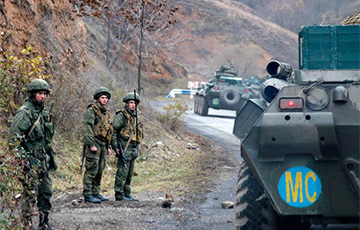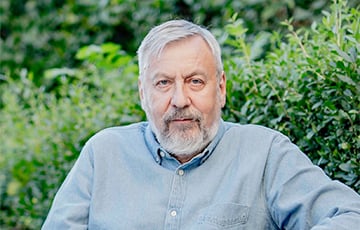The Lesson Of Karabakh: Putin Admits His Helplessness
11- 22.09.2023, 22:05
- 28,886

Russia's allies have something to think about.
On Tuesday, Azerbaijan announced the start of “local anti-terrorist measures” in Nagorno-Karabakh. Armenia turned for help to Russian “peacekeepers” stationed in Karabakh in 2020. Russia, in response to Yerevan’s appeal, expressed “concern” on behalf of the official representative of the Russian Foreign Ministry Maria Zakharova and Putin’s press secretary Dmitry Peskov.
Armenian Prime Minister Nikol Pashinyan criticized Russian “peacekeepers” in Karabakh. According to Pashinyan, the Russian side simply did not want to raise many issues.
In addition, one of the vehicles of the Russian peacekeepers was attacked by Azerbaijan, as a result of which several military personnel were eliminated. Among the dead was the deputy commander of Russia's largest nuclear submarine flotilla, Ivan Kovgan.
Why didn’t the Kremlin support its nominal ally in the CSTO? Will there be a serious reaction to the shooting of peacekeepers?
The Charter97.org website looked at what politicians, experts and opinion leaders think.
Military observer from Israel David Sharp noted that Russia became a strategic mistake for Armenia.
“And this put Russia in a dilemma: to fulfill its allied obligations with Armenia, which is a poor country. Or continue to deal with Azerbaijan, which has a market and Turkey as an ally,” Sharp said.
Russia probably chose the second option, and Azerbaijan won. Today, the aggressor country has its own huge problems in the war that it launched against Ukraine, and it does not have the strength and ability to fulfill its obligations. Azerbaijan took advantage of this.
Well-known publicist Alexander Nevzorov believes that the Russian “peacekeepers” in Karabakh were shot for fun, and the Russian peacekeeping contingent itself “is not capable of anything and is a powerless parasite”:
“Be that as it may, the command of the Russian “peacekeepers” in Karabakh was shot like partridges. They corpsed the deputy commander of the “peacekeeping” contingent without any need, just for fun. As well as the officers accompanying him. At that time, it was already clear that the Russian “peacekeepers” were not even going to engage in any kind of “peacekeeping.”
Gela Vasadze, an expert at the Georgian Center for Strategic Analysis (GSAC), believes that Putin was afraid to intervene in the conflict due to the risk of losing the support of his “friend” — Turkish President Recep Erdogan.
“Russia understands perfectly well how important Turkey is for it now, which, in turn, is a military-political ally of Azerbaijan. Therefore, Russia did not dare to interfere,” Vasadze noted.
Volodymyr Kravchenko, a columnist for the international politics department at ZN.UA, also writes about Russia’s dependence on Turkey. In his opinion, in the context of the Russian-Ukrainian war, the Kremlin cannot afford to open a second front against the Azerbaijani-Turkish tandem:
“Russia, bogged down in a war with Ukraine, does not have enough resources to fulfill this role, and Moscow sacrifices support from Yerevan in order to maintain relations with Baku, one of the influential players in the global energy market.”
Secretary of the National Security and Defense Council of Ukraine Oleksiy Danilov also drew attention to the Kremlin’s weakened positions and inability to provide assistance to its ally:
“All the obligations that Russia took on with regard to Armenia have now been multiplied by zero and it will leave it alone with this problem. This needs to be understood by all Central Asian countries that still have direct relations with Russia. It simply abandons its partners, does not fulfill its obligations.”
Telegram channel “SerpomPo” writes that the Kremlin has found itself in a position of zugzwang:
“Putin’s personal diplomacy failed, and the completely failed Russian Foreign Ministry found nothing better than to turn at the consequences, including its own failure, accusing Armenia of starting to look for other guarantors of its security. [...] Little Azerbaijan, regardless of the huge monster, under its “nose” and contrary to the agreements reached, persistently acts by force, having perfectly calculated the anti-Pashinyan complexes of the great geopolitician and his subordinates.”
One of the leaders of the democratic movement in Armenia in the 1990s, former deputy of the Supreme Council of the republic and ex-ambassador of Armenia to Russia Stepan Grigoryan, in an interview with Charter97.org, expressed the opinion that the international community has once again become convinced of what agreements with Russia are worth and how you can trust the Kremlin’s promises:
“International experts should begin to study this phenomenon; this has never happened in the history of mankind. Yes, sometimes it happens that an ally stops helping you and betrays you. But this has never happened before when an ally refused help and forbade saving its people. This is a new and interesting Putin phenomenon, but Armenia will resist it.
The lesson of Karabakh is of critical importance not only for the CSTO, but also for the “self-proclaimed republics” in Moldova, Georgia and Ukraine, writes the Telegram channel “Sieve of Socrates”:
“Having handed over the leaders of the “NKR” with its giblets, Moscow has lost loyalty in the leadership of similar malignant formations. This picture reveals the seriousness of the problems in the Russian management environment, and no one knows what will be the straw that breaks the camel’s back.”
According to Russian opposition publicist Anatoly Nesmiyan, the completion of the current story of Karabakh will allow Pashinyan to part ways with the Kremlin, leaving all structures connecting Armenia and Russia.
“There is no doubt that Kremlin officials, in their characteristic “intelligent” manner of hungover movers, will snarl and say such things, after which it will become not just easy, but very easy to break off relations with them,” notes Nesmiyan.










